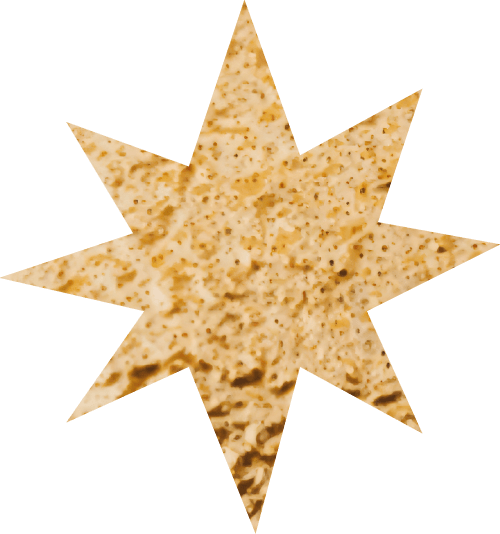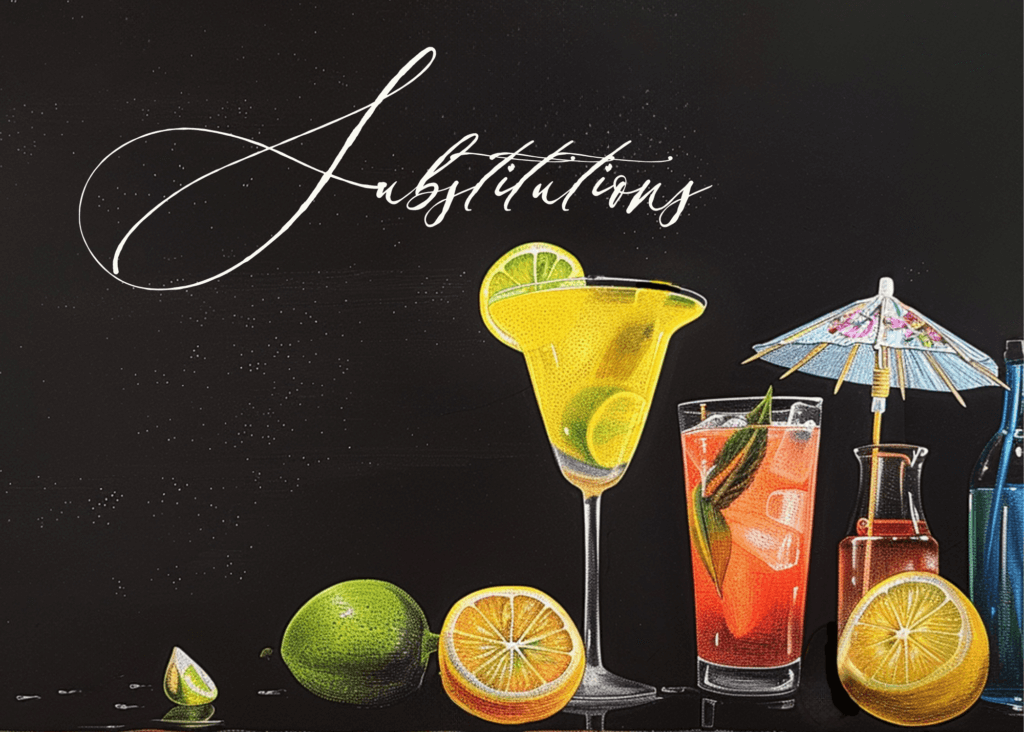Cocktail Bases
Do I have to use tea?
These mocktail recipes and the rituals associated with them are meant to be customized to your liking. If you don’t like caffeine and want to use decaf white tea or herbal tea, go for it! Herbal tea will change the flavor slightly, so I suggest using something mild like chamomile.
If you don’t like tea at all, you can steep the aromatics in plain hot water. I selected tea for these recipes because it contains tannins, which add back in some of the mouthfeel and bite that an alcoholic cocktail contains. So an adapted version will be missing that complexity, but at the end of the day, your enjoyment is what matters.
If you are removing the tea, I suggest you definitely steep the aromatics. Otherwise, you will just be adding water to your mocktail, which is the definition of “watering it down” and may result in an underwhelming mocktail.
Last but not least, if you have found some non-alcoholic spirit substitutions that you love, by all means use those in place of the drink base in these recipes. I wanted to ensure you could make the drinks on this site without having to spend $35 on a specialty item you may or may not be able to find and may or may not hate when you try it. (Sadly, most of the NA spirits I have tried have been pretty awful). But if you have an old standby, simply replace the drink base (the tea + the aromatics) with an equal quantity of your NA spirit.
Then please write to me and tell me which ones you like so that I can add them to my repertoire!
What about coconut water?
Ever since creating my Classic Mojito Mocktail (which quickly became my favorite mocktail recipe on the site) and substituting coconut water for the rum, I’ve come to consider coconut water a good base replacement for alcohol. It’s best suited for rum-inspired mocktails, but if you don’t want to use tea or buy expensive NA spirits, I suggest giving it a try.
The best way to describe it is “a bit salty,” which doesn’t sound appealing, I realize. It’s not off-putting, it just may catch you off guard at first sip. After that, you’ll actually notice it makes the other flavors more prominent while simultaneously muting the flavor of coconut.
If you are serving this mocktail to a coconut hater, however, I do not recommend this substitution.
What do you recommend as a good tequila sub?
Free Spirits is drinkable, but it does have a pretty strong flavor (that is also subtly sweet) that has me still searching for my #1. Lyre’s Agave Blanco Spirit has lots of great reviews; again, I found it drinkable but not at all tequila-flavored. You can read my NA tequila reviews here, here and here.
What do you recommend as a good gin sub?
I haven’t found one yet, but I’m always testing new ones, so bookmark this page and check back soon.
What do you recommend as a good Champagne/Prosecco/Sparkling sub?
I happen to love Be Free NA White Sparkling, especially for mimosas. You can read my review of it here. If you want a bubbly that is super sippable all on its own, I enjoy No and Low Sparkling Chardonnay. Read that review here.
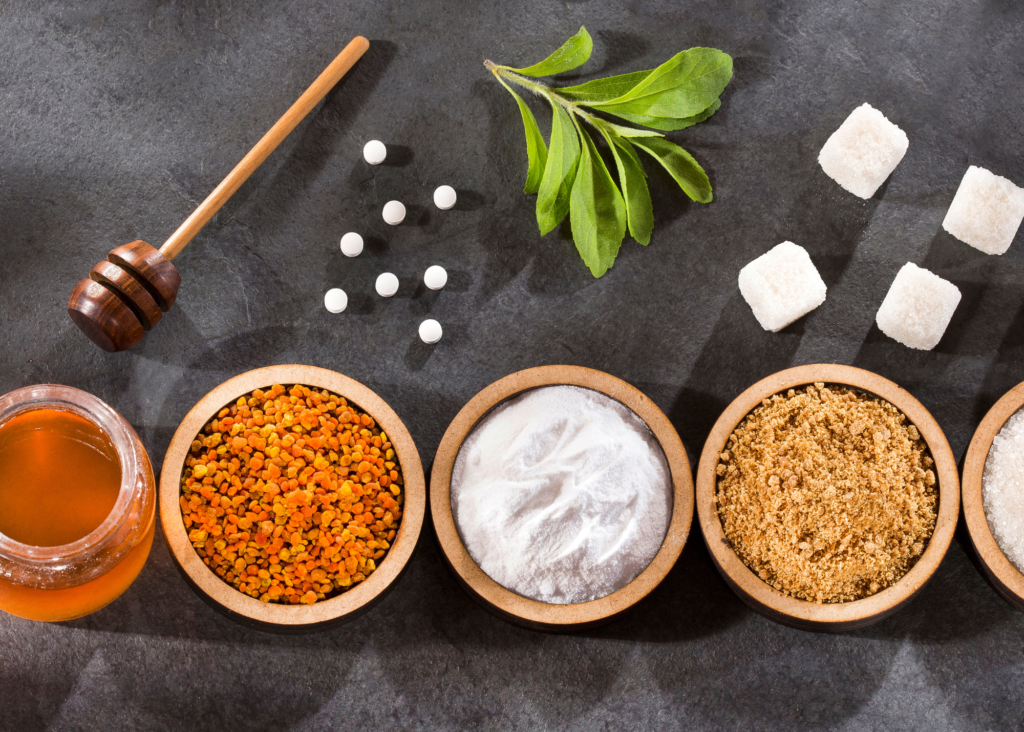
Sweeteners
Most of the cocktail and mocktail recipes I come across call for simple syrup, but you don’t use that. Why not? And can I?
This website is dedicated to creating recipes that are healthy or contain functional ingredients that benefit the body. I personally don’t use white sugar, except on very rare occasions where an alternative sweetener would cause a recipe to fail. For the sake of brevity, I won’t go into my personal reasons for feeling that white sugar should be eliminated from our diets except to say that I only use it for hummingbird nectar.
Honey and coconut sugar – both of which should still be used in moderation – contain nutrients and are much better alternatives, in my opinion. Both have a much stronger flavor than white sugar, however, and both affect the color and final presentation of these mocktails. For that reason, I only use coconut sugar in recipes that are darker in color to avoid making every recipe on this website muddy-looking and brown.
I’m aware that honey may not be everyone’s favorite flavor, and even if you do like it, it creates a different flavor profile in these mocktails than plain sugar will. Therefore a lemon drop recipe on this site will taste different from a lemon drop recipe found elsewhere. If you don’t enjoy the flavor of honey, I recommend using organic cane sugar instead. It is slightly less processed (and non-GMO) than ordinary refined sugar. If you decide to go this route, swap the cane sugar for the sweetener in the recipe at a 1:1 ratio.
If you want to use simple syrup – which is equal parts sugar and water – you will need to use double the amount called for in the recipe. This is because 1 tablespoon of simple syrup is comprised of 1/2 tablespoon of sugar and 1/2 tablespoon of water, so if the recipe calls for 1 tablespoon of sugar, you will need 2 tablespoons of syrup.
What sweeteners can be subbed out for others?
Honey can easily be swapped for maple syrup with minimal change to the resulting flavor. Molasses is quite strong, so I would avoid that in a 1:1 swap. Coconut sugar can be used in place of honey as well but will make your drink dark brown. If you prefer white sugar in your mocktail, I recommend organic cane sugar.
Can I make oleo saccharum without white sugar?
Oleo saccharum is traditionally made with white sugar. This ingredient is necessary to extract the essential oils contained in the citrus peels. Although I prefer to cook with honey, maple syrup or molasses, organic white sugar is the only sweetener that makes this recipe work correctly. I have made it with coconut sugar, but the end result is a muddy brown color that isn’t aesthetically appealing. That said, an alternative method for extracting the oils with the same efficacy is to use non-GMO, food-grade citric acid powder.
The end result will be very citrusy and quite tart, rather than citrusy and sweet, like the original recipe. This means it will require a sweetener such as straight honey or honey simple syrup to achieve the same flavor profile. But this is a good alternative if you want it to look the same but have a hate-hate relationship with white sugar, or feel like it negates the functional, healthy benefits of your mocktail otherwise.
I don’t want to wait for oleo saccharum to mature. Can I still try this recipe?
Yes! While I feel that oleo saccharum is one of the best ingredients out there for adding complexity to a mocktail or cocktail (and that you should absolutely start a batch now, so it’s ready for next time), you can achieve a similar effect using the same quantity of honey simple syrup and a generous amount of zest from whatever citrus the oleo in your recipe calls for.
To make it, simply combine equal parts honey and water and gently heat just until the honey is dissolved. Then add a good amount of citrus zest (to taste) and allow to steep while the mixture cools. You can strain out the zest at that point or leave it in, depending on your preference.
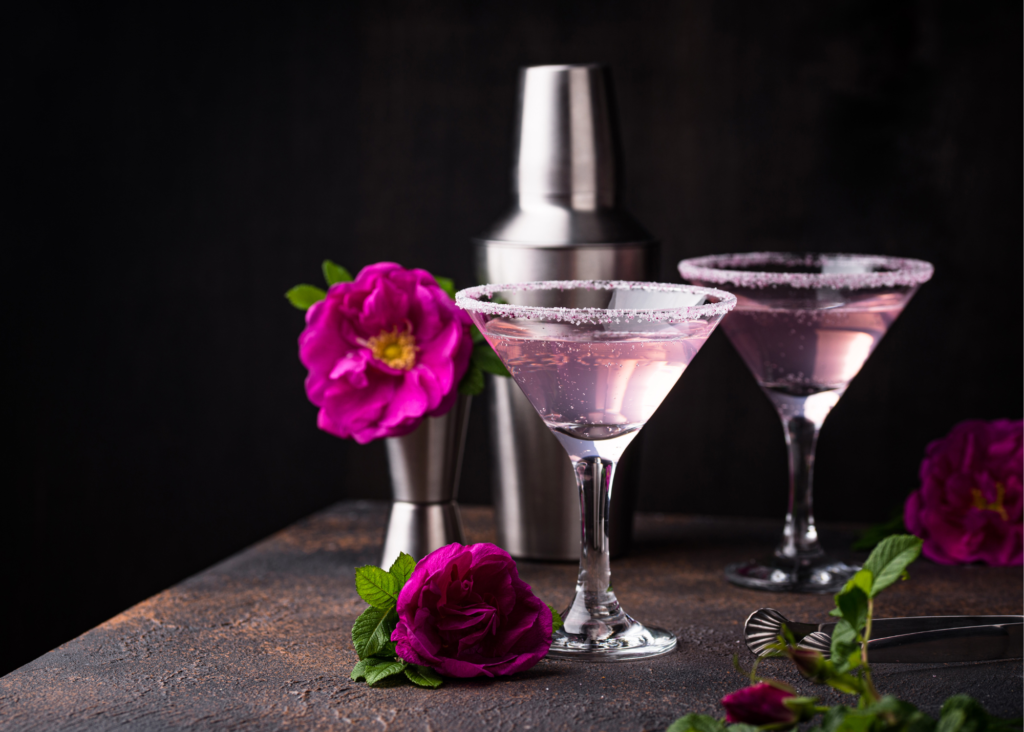
Rimming
Some of these recipes call for a sugar rim, but, as you explained above, refined sugar is the devil. What can I use instead?
One of my favorite alternatives is to use crushed dehydrated fruit* on the rim in place of white sugar. This makes the rim quite a bit more tart, so you can add a pinch or two of organic pure cane sugar and effectively split the difference.
*I prefer to use honey on the rim to make it stick because lime juice can cause the fruit powder to liquefy and drip.
I want to make those dreamy salted citrus rims; what’s the best salt to use?
I use Himalayan pink salt for cooking, but the superfine version can make for an overpowering cocktail rim. Instead, look for a salt that has a bit more texture.
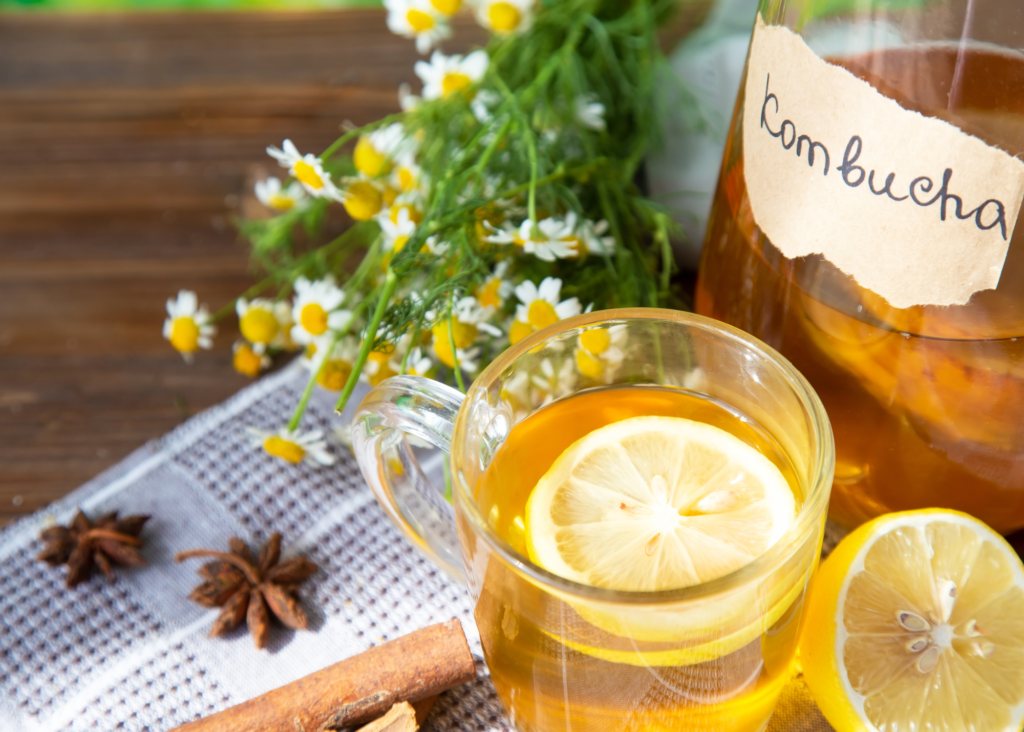
Kombucha
I don’t have kombucha, can I substitute something else?
A shrub will give you almost the same flavor profile. The apple cider vinegar in the shrub recipes on this site mimics the sour tang you get from kombucha, and many of these mocktails make use of bubbly water, which gives you that same kombucha sparkle. Lastly, most of these mocktails use tea as the “base,” just as kombucha starts from a sweetened tea base.
Does kombucha have alcohol?
Kombucha contains a trace amount of alcohol, but the Alcohol and Tobacco Tax and Trade Bureau does not classify it as an alcoholic drink if it contains less than 0.5% alcohol by volume. However, if it contains more alcohol by volume, TTB regulations will apply.
The amount of alcohol in kombucha can vary by commercial brand and homemade varieties may also differ, as many home brewers may not control the processes in the same way. In commercial processes, techniques are used to control the alcohol content, such as a shorter fermentation time or a lower sugar content to limit the amount of alcohol produced during fermentation. Storage temperature can also affect alcohol content, which is one of the reasons I use store-bought kombucha in all of my recipes.
Kombucha brewing and flavoring techniques could warrant a whole website of their own, and I haven’t loved my results as much as store-bought. That’s why I have kept it simple on this site, but if brewing booch is your jam, by all means use homemade in place of my recommendations.
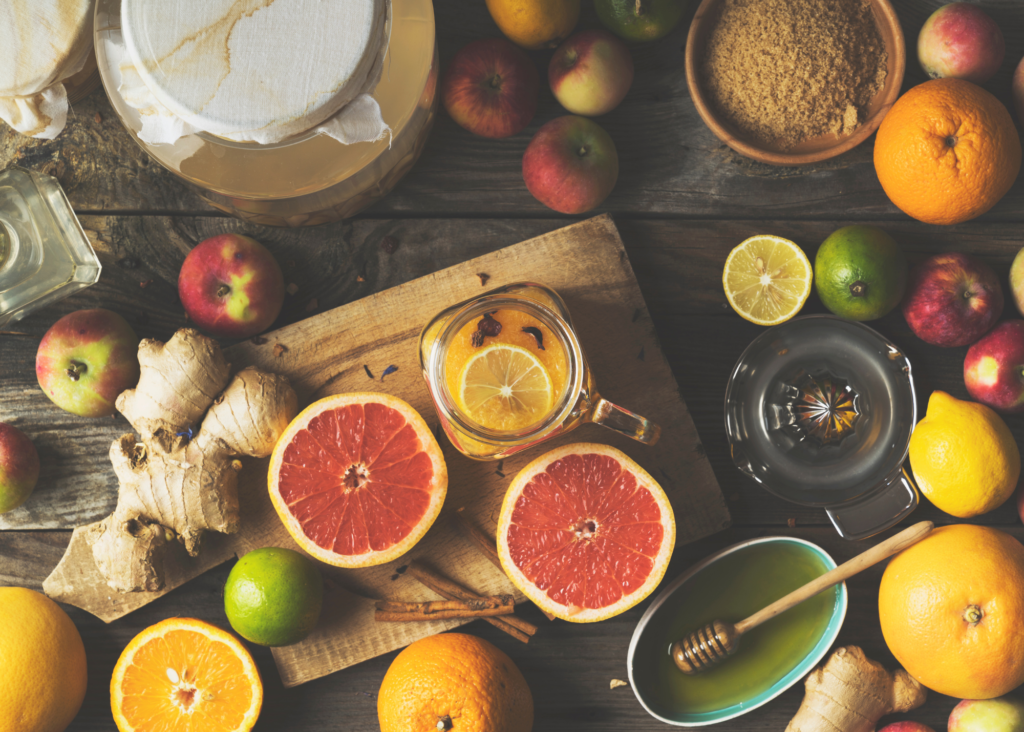
Shrubs, Oxymels and Switchels
What the heck are these things?
Shrubs, oxymels and switches are all forms of drinking vinegar, which are believed to have health benefits. Not only that, their sweet-tart flavor makes for interesting and nuanced cocktails and mocktails. If you’re a kombucha lover (i.e. you’re into strong, tart and tangy flavors), you will love these.
Shrubs are made from vinegar, sugar and fruit, often married with an aromatic herb, like this Strawberry Cardamom Shrub.
Oxymel means “acid honey” and was believed by the ancient Greeks and Romans to be a cure-all tonic. While it shares some similarities with shrubs, oxymel is specifically made with raw honey, apple cider vinegar and herbs – no fruit.
Switchel is a fermented drink that originated in the Caribbean and consists of apple cider vinegar, water, a natural sweetener (honey, maple syrup, molasses, sugar) and a flavoring (ginger or lemon).
Can I make a shrub without white sugar?
Yes! I use coconut sugar for mine all the time. This makes the color darker, but if the recipe calls for dark vinegar or dark fruit, it isn’t noticeable.
You can also use the same amount of honey in place of the sugar, which technically makes the resulting brew more like an oxymel (see above). Oxymels are typically made with honey and herbs, so a concoction made with honey and fruit, or honey, fruit and herbs lands somewhere in between.
I don’t want to wait for my shrub to mature. Can I still try this recipe?
Technically, yes. You could substitute half the quantity of shrub for apple cider vinegar, and half for honey simple syrup. You could also muddle the fruit and herbs, or even steep the herbs with the tea base. I don’t love this alternative because I find the apple cider vinegar to be a bit harsh when it hasn’t had time to mellow with the other flavors in a shrub. But in a pinch, this would work.
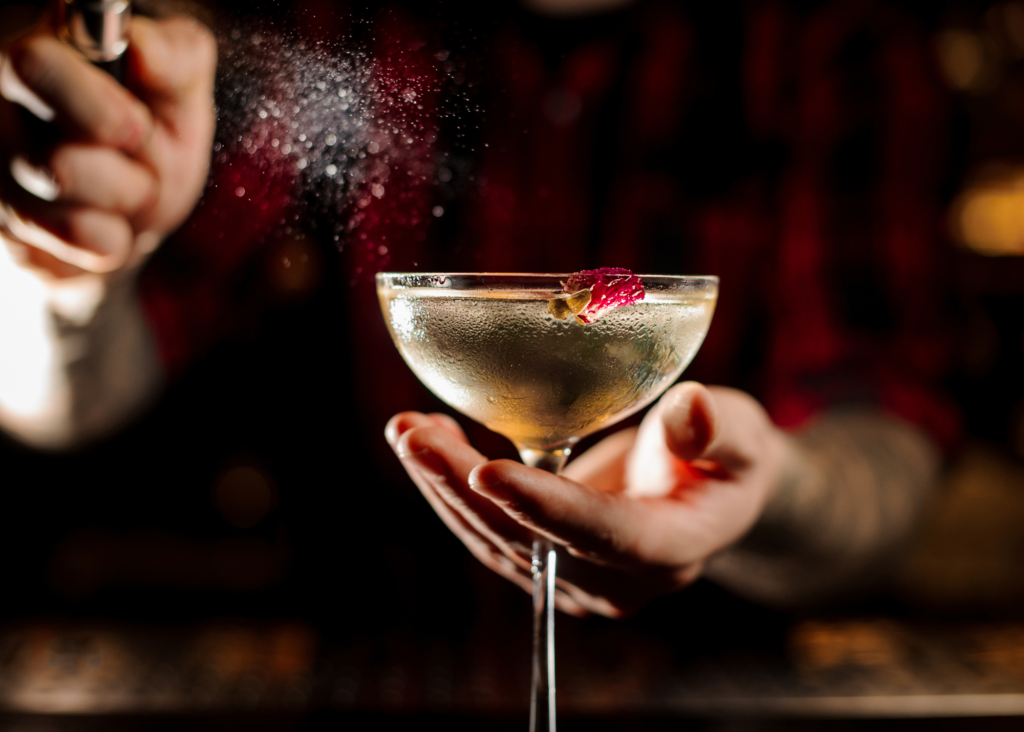
Bitters
Can I make bitters without alcohol?
Bitters generally contain between 35-45% alcohol by volume. However, because they are typically used in such small amounts, once they’re diluted into an otherwise non-alcoholic drink like a glass of club soda, they’re often considered to be non-alcoholic (like vanilla extract in baking).
This can be a slippery slope for folks in recovery, though. A few dashes of bitters in an NA cocktail certainly won’t get you drunk, but one dash too many can easily put your drink over the 0.5% ABV threshold that defines “non-alcoholic” beverages – and outside the comfort level of folks who identify as sober or alcohol-free. There’s a great post at Alcademics that breaks down the exact ABV of drinks made with bitters.
To make non-alcoholic bitters, substitute non-GMO, food-grade glycerin to provide a similar effect without compromising on taste. Check back here often; I’ll have a recipe for this coming soon!
